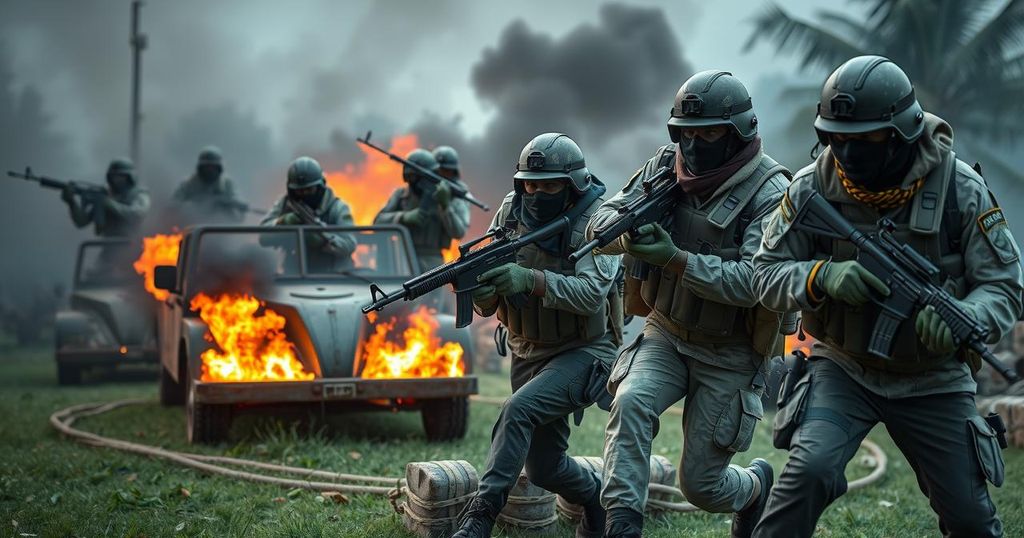Escalating Tensions: M23 Rebels Claim ‘Existential War’ in Eastern DRC

The M23 conflict in eastern DRC has escalated, with the rebel group advocating for the protection of Congolese Tutsis amid allegations of Rwandan support. The DRC government views M23 as a significant threat, leading to failed peace efforts and ongoing violence, resulting in extensive displacement. Both sides assert their positions, complicating prospects for dialogue.
The ongoing conflict in eastern Democratic Republic of the Congo (DRC) has escalated significantly, particularly between government forces and the M23 rebel group, which is defending what they term an “existential war.” Bertrand Bisimwa, head of M23’s political wing, emphasizes the group’s fight as essential for the protection of Congolese Tutsis, whom he asserts have faced long-standing discrimination linked to their ethnic ties with Rwanda.
This conflict, intensifying over the past three years, has led to substantial casualties and the displacement of close to two million individuals. Initially formed in 2012 following a military mutiny within the Congolese army, M23 experienced early setbacks but resumed hostilities in 2022, seizing significant territories in North Kivu, asserting their mission to defend minority Tutsis.
Bisimwa articulated the group’s defensive posture, stating, “We are waging a defensive war to protect these citizens… They are not second-class citizens. The state must take care of them.” Meanwhile, the DRC government perceives M23 as a primary security threat, exacerbated by accusations from international entities, including the United Nations, alleging Rwandan support for the rebel group, which Kigali has denied.
Despite attempts to broker peace through earlier initiatives such as the 2022 Nairobi process and Angola-led mediation, significant progress has been limited. Following M23’s recent advances in Lubero, Bisimwa contended that their actions are a legitimate response to government aggression, stating, “We cannot be blamed for defending ourselves…” He articulates that the group’s ongoing territorial control aims to halt violence and allow for the repatriation of displaced citizens.
The DRC government remains staunchly opposed to engaging in dialogue with M23, labeling the group as a Rwandan proxy. In light of this, Bisimwa criticized the government’s refusal to negotiate, arguing, “War cannot solve our problems. Dialogue alone can address the root causes of the conflict.” Additionally, the group has faced allegations of collusion with other armed factions, which Bisimwa rebuffed, focusing instead on M23’s governance efforts and their commitment to protecting local communities.
He further noted the group’s involvement in preserving Virunga National Park, seeking to mitigate illegal practices and enhance wildlife conservation. Despite the overarching conflict, M23 asserts a firm desire for peaceful resolution through dialogue, as reiterated by Bisimwa’s closing remark: “If Kinshasa cannot solve our problems, it should let us solve them ourselves.”
The M23 conflict in eastern DRC originates from complex ethnic tensions and historical grievances, particularly surrounding the treatment of Congolese Tutsis. The DRC army and the M23 rebel group have been locked in a violent confrontation since the group’s resurgence in 2022, following years of relative dormancy after its initial formation in 2012. The conflict has led to severe humanitarian crises, including widespread displacement and fatalities, while international actors have raised alarms regarding external support linked to Rwanda.
The intensifying conflict in eastern DRC underscores the challenging dynamics between the M23 rebel group and the Congolese government. As M23 portrays its fight as essential to protect an ethnic minority facing discrimination, both parties restate firm positions on negotiations and military strategies. The absence of dialogue continues to hinder potential resolutions, emphasizing the need for sustained international engagement and a reassessment of local governance issues.
Original Source: eastleighvoice.co.ke








